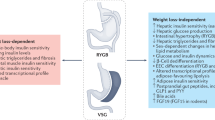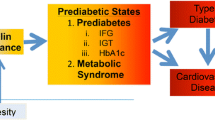The prevalence of type 2 diabetes mellitus (T2DM) and obesity in the western world is steadily increasing. Bariatric surgery is an effective treatment of T2DM in obese patients. The mechanism by which weight loss surgery improves glucose metabolism and insulin resistance remains controversial. In this review, we propose that two mechanisms participate in the improvement of glucose metabolism and insulin resistance observed following weight loss and bariatric surgery: caloric restriction and weight loss. Nutrients modulate insulin secretion through the entero-insular axis. Fat mass participates in glucose metabolism through the release of adipocytokines. T2DM improves after restrictive and bypass procedures, and combinations of restrictive and bypass procedures in morbidly obese patients. Restrictive procedures decrease caloric and nutrient intake, decreasing the stimulation of the entero-insular axis. Gastric bypass (GBP) operations may also affect the entero-insular axis by diverting nutrients away from the proximal GI tract and delivering incompletely digested nutrients to the distal GI tract. GBP and biliopancreatic diversion combine both restrictive and bypass mechanisms. All procedures lead to weight loss and decrease in the fat mass. Decrease in fat mass significantly affects circulating levels of adipocytokines, which favorably impact insulin resistance. The data reviewed here suggest that all forms of weight loss surgery lead to caloric restriction, weight loss, decrease in fat mass and improvement in T2DM. This suggests that improvements in glucose metabolism and insulin resistance following bariatric surgery result in the short-term from decreased stimulation of the entero-insular axis by decreased caloric intake and in the long-term by decreased fat mass and resulting changes in release of adipocytokines. Observed changes in glucose metabolism and insulin resistance following bariatric surgery do not require the posit of novel regulatory mechanisms.
Similar content being viewed by others
Author information
Authors and Affiliations
Rights and permissions
About this article
Cite this article
Gumbs, A.A., Modlin, I.M. & Ballantyne, G.H. Changes in Insulin Resistance Following Bariatric Surgery: Role of Caloric Restriction and Weight Loss. OBES SURG 15, 462–473 (2005). https://doi.org/10.1381/0960892053723367
Published:
Issue Date:
DOI: https://doi.org/10.1381/0960892053723367




